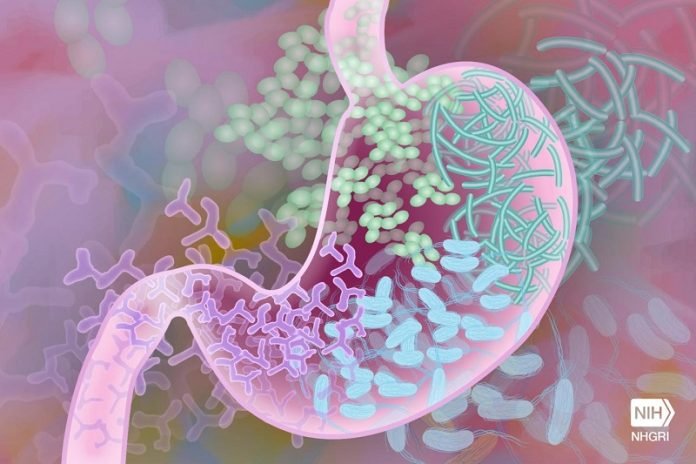
A new study from the University of Illinois shows that following the Dietary Guidelines for Americans (DGA) can promote healthy gut microbiota that supports overall health.
The microbiota is a collection of trillions of microorganisms that live in the gastrointestinal tract and contribute to many physiological processes.
Diverse gut microbiota may help promote resilience to disruptions that could contribute to disease.
The researchers analyzed data from the American Gut Project, a large crowdsourced database that includes fecal samples from thousands of individuals across the United States.
They focused on data from 432 healthy individuals who were divided into three groups based on how closely they followed the Healthy Eating Index (HEI), which is based on the DGA.
The group with the highest total HEI score, indicating the strongest compliance with the DGA, had the highest gut microbiota diversity, as well as a larger presence of bacteria that contribute beneficial functions like fiber fermentation.
The gut microbiota is good at breaking down fiber, which is important because humans cannot digest fiber.
Study participants with a higher diet quality had a greater abundance of bacteria involved in fiber metabolism.
Dietary guidelines and nutrient recommendations have not historically included considerations for the microbiota. However, the researchers suggest that this could change in the future.
The study provides clues for specific microbes that may be relevant for monitoring the health of the microbiota and overall health.
As we understand more about the interaction of diet, microbiota, and health, some gut microbes may become targets of our dietary recommendations.
Health policy is also starting to recognize the importance of the gut microbiome, the researchers say.
The scientific report for the latest DGA acknowledges that evidence from diet-microbiota studies should be considered in future dietary recommendations.
The researchers note their study supports the current DGA recommendations for a diet rich in fruits, vegetables, and fiber.
Following those guidelines, outlined in MyPlate, is still the best strategy for overall health, including nourishing your gut microbes.
How to protect gut health
The health of our gut microbiota, the trillions of microorganisms living in our gastrointestinal tract, is important for our overall health.
To protect gut health, we should follow a healthy diet that supports diverse gut microbiota.
This is according to a new study from the University of Illinois that analyzed data from the American Gut Project, a large database with fecal samples from thousands of individuals across the U.S.
The study found that people who followed the Dietary Guidelines for Americans (DGA) had a gut microbiota composition that may support overall health.
The DGA recommends a diet rich in fruits, vegetables, and fiber. Participants who had a higher diet quality, according to the Healthy Eating Index, had a greater abundance of bacteria involved in fiber metabolism.
The gut microbiota plays a role in many physiological processes, and diverse gut microbiota may promote resilience to disruptions that could contribute to disease.
A healthy gut microbiota is good at breaking down fiber, which is important because humans cannot digest fiber.
By breaking down fiber, the gut microbiota produces beneficial compounds that may support overall health.
Health policy is starting to recognize the importance of the gut microbiome.
The scientific report for the latest DGA acknowledges that evidence from diet-microbiota studies should be considered in future dietary recommendations.
Understanding how diet may influence the structure of the gut microbiota is important so that we can make recommendations on dietary approaches to support gut health.
To protect gut health, we should follow a healthy diet that supports a diverse gut microbiota. This means eating plenty of fruits, vegetables, and fiber.
By following the Dietary Guidelines for Americans, we can promote a gut microbiota composition that may support overall health.
While recommendations for testing and monitoring the gut microbiota are not yet standard practice, future research may lead to dietary recommendations that support specific gut microbes.
If you care about nutrition, please read studies that eating nuts may help reduce risks of the gut lesion and cancer, and how tea and coffee influence your risk of high blood pressure.
For more information about nutrition, please see recent studies that anti-inflammatory diet could help prevent fatty liver disease, and vitamin D could help lower the risk of autoimmune diseases.
The study was published in The Journal of Nutrition.
Copyright © 2023 Knowridge Science Report. All rights reserved.



